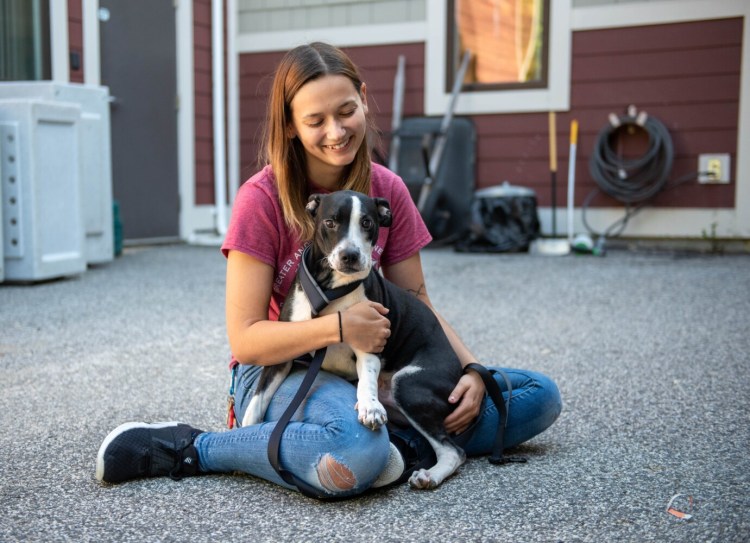LEWISTON — When Hurricane Ida hit Louisiana last month, at least two Maine animal shelters answered the call to help relieve overcrowded rescues in the South.

Greater Androscoggin Humane Society transport coordinator Delanie Strout, left, and foster and feline coordinator Angela Poulin in front of the Wings of Rescue cargo plane that brought 25 dogs and cats from Louisiana to Portland International Jetport on Sept. 11. GAHS took in 10 of the animals. Katie Lisnik photo
Arriving by cargo plane Saturday at the Portland International Jetport, 25 dogs and cats made their way from hard-hit areas of Louisiana, where some animal shelters were still without electricity as recently as last week, to their new (temporary) homes at the Greater Androscoggin Humane Society in Lewiston and the Animal Refuge League of Greater Portland in Westbrook.
Through its transport program, GAHS works with shelters and rescues in a number of states, Executive Director Katie Lisnik said.
“And then this was sort of a special one because of the hurricane, you know. (We wanted) to help in any way we could with pets needing to move out of that impacted area,” she said.
The non-profit organization Wings of Rescue, which flies animals from hard-hit shelters, either due to disasters or overcrowding, to areas with empty kennel space, organized Saturday’s rescue mission. A total of 78 dogs and 58 cats started their journey in Hammond, Louisiana, and made stops in Hampton Roads, Virginia, and Coatesville, Pennsylvania, before landing in Portland Saturday afternoon.
“They’re doing wonderful. They’re settling into the shelter and into foster homes,” ARL’s director of community engagement, Jeana Roth said Monday.
“Some of them need some advanced medical treatment that we’re working through right now but we anticipate some of them being available for adoption in the near future.”
All animals brought into Maine must go through a quarantine period that’s typically two to five days, depending on their age.
ARL has worked with Wings of Rescue a number of times before and reached out to GAHS for this particular run.
“It’s a mass evacuation and it looks like at least six facilities were involving in sending their animals out,” Roth said. “So, it’s a large-scale emergency response. And it really is an effort of collaboration across the country because the animals need to evacuate the shelters where they don’t have power and water and fly somewhere where they know the opportunity of adoption awaits them.”
But taking in animals from hard-hit areas isn’t new to GAHS, either. The day after the five dogs and five cats arrived at the Lewiston rescue, they were joined by eight dogs from Georgia. And this weekend, staff is heading to Oklahoma to pick up as many as 20 adult dogs and puppies.
“The biggest challenge with the transport program is to balance the numbers, knowing how many kennels we have open and then to be able to say yes to a transport, but to still serve our local community,” Lisnik said.
The Georgia and Oklahoma transports are from overcrowded shelters.

Pretty Girl reaches through the bars of her kennel Monday at the Greater Androscoggin Humane Society in Lewiston. Pretty Girl was brought to Lewiston by Wings of Rescue from a shelter impacted by Hurricane Ida. Andree Kehn/Sun Journal
“So, animals that are coming in as strays or owner surrenders, we always try to balance and have kennels open to serve the local dogs as well because we don’t want to give them the short end of the stick and fill the kennels with transport (animals,)” she said.

Staff and volunteers with Animal Refuge League of Greater Portland unload animals from a Wings of Rescue cargo plane Sept. 11 at the Portland International Jetport. Wings of Rescue transported 25 dogs and cats from shelters hit by Hurricane Ida in Louisiana. Kyra Hunsicker/Animal Refuge League of Greater Portland
The dogs and cats from Louisiana were already in shelters and ready to adopt before Ida hit, Wings of Rescue president Ric Browde said. Beloved pets can go missing in the melee of a disaster, or owners are left with no other choice but to surrender their pets for the short- or long-term.
And it’s important that the stray animals that come into a shelter or rescue as a result of a disaster are kept in-state in case their owners are looking for them.
That’s where Wings of Rescue comes in, helping move the adoptable animals to shelters out-of-state with extra room to help the local shelters prepare for the influx of animals following a major storm, like Ida.
Saturday’s flight was the organization’s fourth flight from Ida-hit areas of the South and it has rescued 610 animals so far, according to its Facebook page.
They’re planning another flight for this coming Saturday, which may be delayed due to yet another storm — Tropical Storm Nicholas.
If you are interested in adopting or fostering, visit Greater Androscoggin Humane Society at gahumane.org or Animal Refuge League at arlgp.org.
Send questions/comments to the editors.


